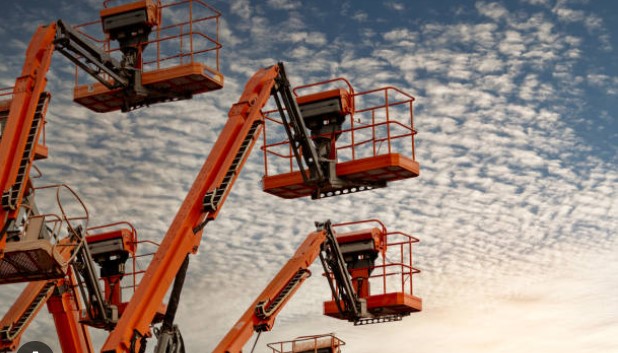Augmented Reality for Training and Maintenance: Introduction
In the industrial sector, the use of lifting equipment is essential for various operations, ranging from construction to logistics. As these machines become more sophisticated, ensuring their proper use and maintenance is paramount. Enter augmented reality (AR), a technology that is revolutionizing training and maintenance practices. This article explores how AR is ushering in a new era for lifting equipment manufacturers and operators, enhancing safety, efficiency, and effectiveness.
The Rise of Augmented Reality in Industry
What is Augmented Reality?
Augmented reality overlays digital information onto the physical world, providing an enhanced view of the real environment. This technology uses devices like smartphones, tablets, and AR glasses to display information, instructions, and interactive elements that can aid in various tasks.
The Industrial Adoption of AR
Initially popularized in gaming and entertainment, AR has found significant applications in industrial settings. Its ability to provide real-time, context-specific information makes it an invaluable tool for training and maintenance, particularly for complex machinery like cradle lifting equipment.
Benefits of AR in Training for Lifting Equipment
Enhanced Learning Experiences
Traditional training methods often involve lengthy manuals and classroom sessions that may not fully prepare operators for real-world scenarios. AR transforms training by providing immersive, hands-on experiences. Trainees can interact with virtual models of lifting equipment, learning controls, safety protocols, and operational procedures in a simulated environment that mirrors real-world conditions.
Immediate Feedback and Correction
AR-enabled training systems can provide instant feedback and guidance. For instance, if a trainee makes an error while operating a virtual lifting device, the system can immediately highlight the mistake and offer corrective instructions. This instant feedback loop accelerates learning and helps reinforce proper techniques.
Safe Training Environment
Using AR for training eliminates the risks associated with on-the-job learning. Trainees can practice operating heavy lifting equipment in a controlled, virtual setting without the potential for accidents or equipment damage. This approach ensures that operators are well-prepared and confident before handling actual machinery.
Read also:Why Every Healthcare Facility Needs a DocVA Virtual Medical Assistan
AR in Maintenance and Troubleshooting
Real-Time Diagnostics
One of the most significant advantages of AR in maintenance is its ability to provide real-time diagnostics. Technicians can use AR devices to scan lifting equipment and receive immediate data on performance metrics, potential issues, and maintenance needs. This proactive approach helps in identifying problems before they escalate, reducing downtime and repair costs.
Interactive Maintenance Guides
Lifting equipment manufacturers can integrate AR into maintenance manuals, providing interactive guides that overlay step-by-step instructions directly onto the equipment. Technicians can see exactly where and how to perform tasks such as inspections, repairs, and part replacements. This reduces the likelihood of errors and ensures maintenance procedures are followed correctly.
Remote Assistance
AR enables remote support from experts who can virtually “see” the equipment and guide technicians through complex maintenance tasks. This capability is especially valuable for these equipment manufacturers who provide global support. Experts can diagnose issues and provide real-time solutions without the need for on-site visits, saving time and resources.
Case Studies: AR in Action
Construction Industry
In the construction industry, equipment such as cranes and hoists are critical. A leading equipment manufacturer implemented AR training and maintenance systems for their clients. The result was a significant reduction in training time and improved equipment uptime, as operators and technicians could access real-time support and detailed maintenance guides.
Logistics and Warehousing
AR has also made a substantial impact in logistics and warehousing, where lifting equipment like forklifts and pallet jacks are extensively used. AR systems help in optimizing the maintenance schedules and ensuring that operators are trained efficiently. This has led to increased operational efficiency and reduced instances of equipment failure.
Future Prospects of AR in Lifting Equipment
Integration with IoT
The future of AR in this equipment lies in its integration with the Internet of Things (IoT). IoT-enabled equipment can continuously monitor and transmit performance data, which can then be analyzed and displayed using AR. This integration will further enhance predictive maintenance capabilities and operational efficiency.
Continuous Improvement and Innovation
As AR technology evolves, lifting equipment manufacturers are likely to develop even more sophisticated training and maintenance solutions. The continuous improvement in AR hardware and software will lead to more immersive and intuitive experiences, further revolutionizing the industry. Read more about Wuxi suspended platforms here.
- Conclusion
Augmented reality is setting a new standard for training and maintenance in the lifting equipment industry. By providing immersive training experiences, real-time diagnostics, and interactive maintenance guides, AR is enhancing safety, efficiency, and effectiveness. Such manufacturers who embrace this technology will not only improve their product offerings but also ensure that their clients can operate and maintain their equipment with greater confidence and proficiency. As we move into this new era, the integration of AR with this equipment promises to deliver unprecedented benefits across various industries.
